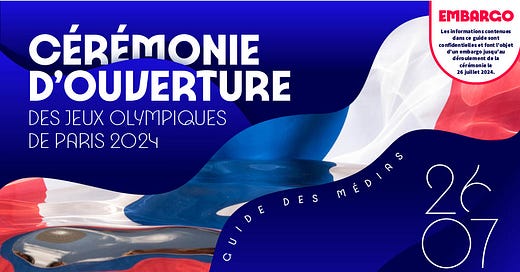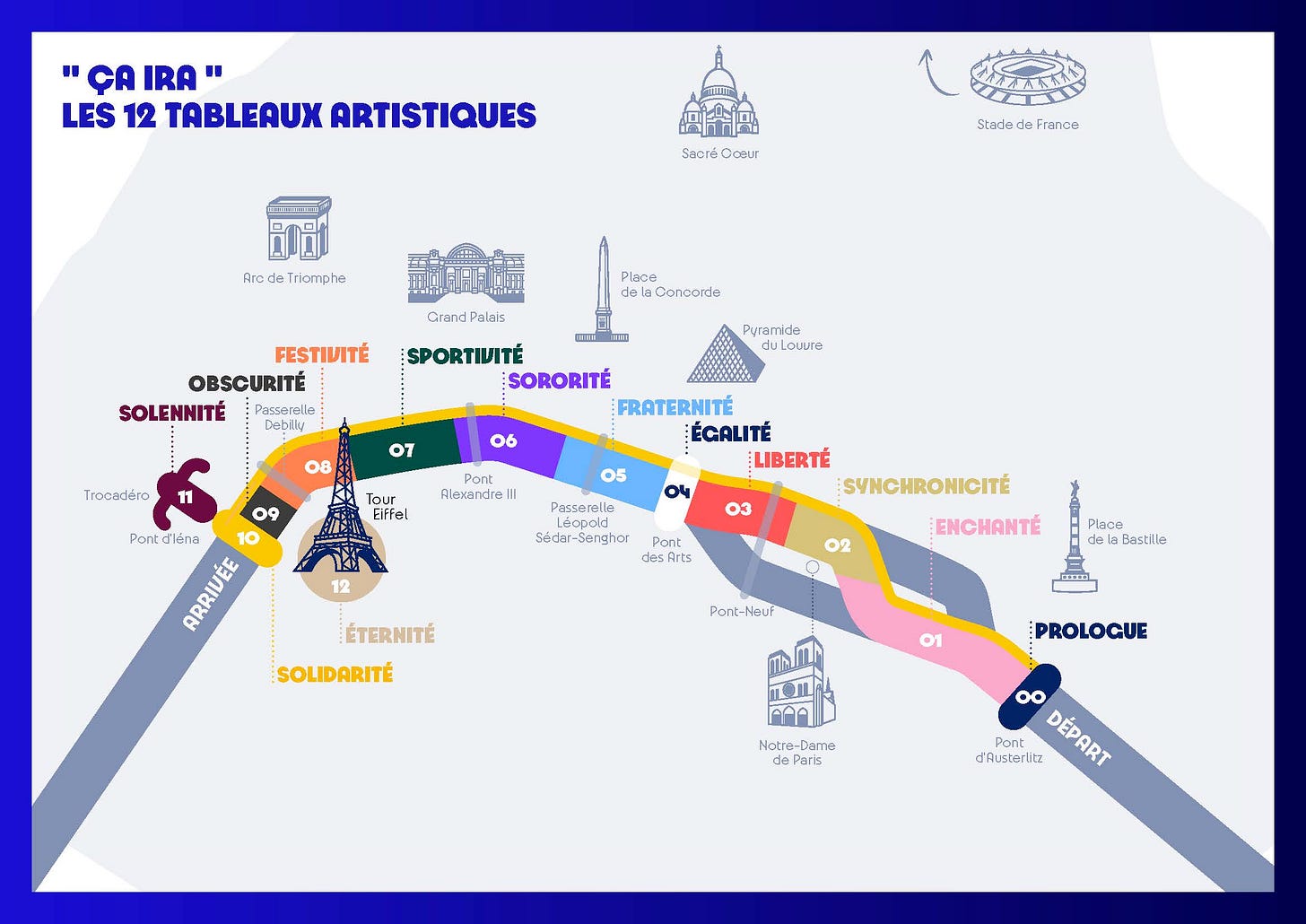Could you have commentated the Paris 2024 opening ceremony?
Of course, with the right cheat sheet
Bonjour, c’est Véro.
Paris 2024: One week later
The dust has settled. The magical Olympics cauldron - the star of the show! - has been put out for a few days at least. By August 28 the Para-Olympic Games will start and the cauldron will light up Parisian nights once again.
Many visitors have gone home raving about the event from show-stopping competition sites to volunteers, logistics to fan zones. Everyone seemed to agree about one thing: For two blessed weeks Paris was transformed into an urban La La Land where “tout le monde il est beau, tout le monde il est gentil.” Oh, what a wonderful world this was, a joyous time according to many. Vive le sport!
Not a complaint, not a (French) grump in sight - even if some young athletes-turned-content creators whined at length about their lives at the Olympic Village on social media, prompting irate comments from their devoted fans along the lines of “Paris 2024: The worst Olympics EVAH!”
Some had clearly not gotten over the surprising and controversial Opening Ceremony.
I met France with Vero patrons on Zoom a few days ago to chat about the event. We were lucky to have with us several people who had either attended (or volunteered at) the Games. We learned a lot.
I confided that during my American vacation I had followed the Games in earnest - remotely as it was, nothing new for this former expat who spent over two decades cheering on her homeland from afar, in good times and in bad.
One thing continued to puzzle me about the Opening Ceremony until I flew home
In the US I heard about several controversies like the alleged mocking of Christianity (picked up with gusto by conservative US TV networks) and the “disjointed” tableaux, so puzzling to so many around the world including some media commentators. They seemed clueless to their viewers, laughing, talking over the performances, exclaiming “Wow!” a few too many times or stunned into silence. I couldn’t compare with the French commentators since no replays were available from outside France.
Two days later I sat at the desk in the rental apartment before meeting friends and wrote a story titled: “Paris Opening Ceremony: How a LOT got lost in translation”
I looked at the event from a cross-cultural and linguistic perspective and acknowledged parts of the ceremony had been opaque to say the least.
I finally suggested there should have been Cliff Notes of sorts to help decipher references in the 12 lavish tableaux that unfolded in the course of almost 4 hours.
Come on, though. Had Paris and France financed such an ambitious production, filled with French cultural and historical references without bothering to make them accessible to everyone watching?
Finding the missing element
As it turns out there were Cliff Notes and great ones too.
Among the many comments I replied to in the days that followed the publication of my story a reader mentioned she had learned from a journalist friend in Montreal that France had indeed released a very thorough introduction of the Opening Ceremony for the media, a 33-page, colorful document, the How-to Guide if you will. A journalist friend of mine reporting from Paris on July 26 confirmed.
She forwarded a copy in French and I am sharing a few pages here.
On the right hand side of the cover the word “Embargo” a reminder the press kit had to be kept confidential until the ceremony started at 7:30pm on July 26. There’s no telling how early (or late) accredited news media received the information.
As soon as I arrived in France I watched the replay of the original broadcast on France 2, the French public national television channel (available on FranceTV.) The commentators did a good job and knew when to comment and when to let the show unfold, most of the time at least. They knew historical references or the names of musicians and artists. It was clear: They had studied the How-to Guide.
And now I am mad.
Whether audiences found the audacious ceremony wonderful or plain weird they were entitled to the information laid out in the didactic document provided to the press.
Many were short-changed and got a plethora of commercial breaks instead.
Were some commentators too self-confident assuming they would be fine discussing sports (Ooops, there was a lot more included in the ceremony) or France and its culture? (By now they know there’s a little bit more to France than what Mademoiselle Emily shares from Paris.)
Did they decide to not do their homework? Did they just run out of time or were they discouraged by the document length? We will never know.
C’est dommage.
After taking a closer look at the detailed explanations provided for each of the 12 tableaux I realize there might not have been that much controversy had everyone delivered.
Here’s a list of all the tableaux. Each came with very detailed notes.
The “Liberté” (Liberty) segment for example was a favorite of mine. It was rich, daring, surprising, blending the past and the present (French revolution/heavy metal anyone?) like the ceremony itself.
There was much to learn from the organizers and all contributors involved in this one-of-a-kind event.
Time to turn the page now and celebrate the athletes of the upcoming Para-Olympic games.
Kudos to all the athletes.
Kudos to France. You pulled it off!
“Ah, ça ira, ça ira, ça ira!”
A bientôt.
Véro
If you are in the mood for some homework here is additional information for you:
Opening Ceremony. Media How-to Guide. French version. Link.
Opening Ceremony. Media How-to Guide. English version. Link.






How very sad that NBC celebrity hosts did not receive or did not read the “cliff notes”. NBC did such a great job covering the Olympics. Shameful that the controversy could have been avoided with preparation. There was so much beauty, culture and history to show to the world.
Lost opportunity.
Thanks for the extra information, which, had American commentators read it, could have provided a richer and more comprehensive explanation of the proceedings within the context of French culture and history for viewers. American commentators often seek to be part of the entertainment rather than sources of interesting background or information. I don't know if they think viewers will be bored, but, in this case, an informed commentary would have only added to the enjoyment and also might have avoided some of the misinterpretation of (and some outrage at) certain portions of the program. You've done us a service by offering us all an in-depth look.